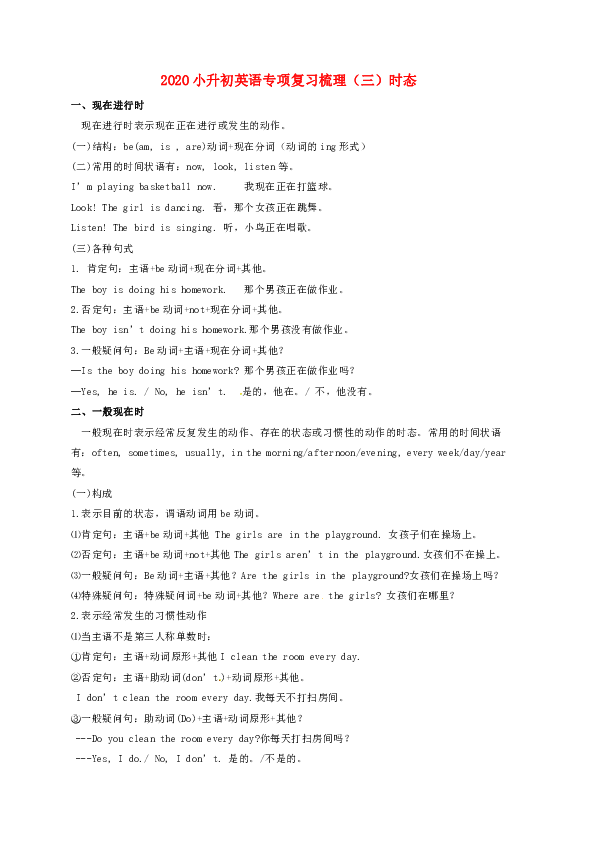
2020小升初英语专项复习梳理(三)时态 一、现在进行时 现在进行时表示现在正在进行或发生的动作。 (一)结构:be(am, is , are)动词+现在分词(动词的ing形式) (二)常用的时间状语有:now, look, listen等。 I’m playing basketball now. 我现在正在打篮球。 Look! The girl is dancing. 看,那个女孩正在跳舞。 Listen! The bird is singing. 听,小鸟正在唱歌。 (三)各种句式 1. 肯定句:主语+be动词+现在分词+其他。 The boy is doing his homework. 那个男孩正在做作业。 2.否定句:主语+be动词+not+现在分词+其他。 The boy isn’t doing his homework.那个男孩没有做作业。 3.一般疑问句:Be动词+主语+现在分词+其他? ─Is the boy doing his homework? 那个男孩正在做作业吗? ─Yes, he is. / No, he isn’t. 是的,他在。/ 不,他没有。 二、一般现在时 一般现在时表示经常反复发生的动作、存在的状态或习惯性的动作的时态。常用的时间状语有:often, sometimes, usually, in the morning/afternoon/evening, every week/day/year等。 (一)构成 1.表示目前的状态,谓语动词用be动词。 ⑴肯定句:主语+be动词+其他 The girls are in the playground. 女孩子们在操场上。 ⑵否定句:主语+be动词+not+其他The girls aren’t in the playground.女孩们不在操上。 ⑶一般疑问句:Be动词+主语+其他?Are the girls in the playground?女孩们在操场上吗? ⑷特殊疑问句:特殊疑问词+be动词+其他?Where are the girls? 女孩们在哪里? 2.表示经常发生的习惯性动作 ⑴当主语不是第三人称单数时: ①肯定句:主语+动词原形+其他I clean the room every day. ②否定句:主语+助动词(don’t)+动词原形+其他。 I don’t clean the room every day.我每天不打扫房间。 ③一般疑问句:助动词(Do)+主语+动词原形+其他? --Do you clean the room every day?你每天打扫房间吗? --Yes, I do./ No, I don’t. 是的。/不是的。 ④特殊疑问句:特殊疑问词+一般疑问句式? What do you do every day? 你每天做什么? ⑵当主语是第三人称单数时: ①肯定句:主语+动词单三+其他。She cleans the room every day.她每天打扫房间。 ②否定句:主语+助动词(doesn’t)+动词原形+其他。 She doesn’t clean the room every day.她每天不打扫房间。 ③一般疑问句:助动词(Does)+主语+动词原形+其他? --Does she clean the room every day?她每天打扫房间吗? --Yes, she does./ No, she doesn’t.是的。/不是的。 ④特殊疑问句:特殊疑问词+一般疑问句式?What does she do every day?她每天做什么? 三、一般将来时 一般将来时表示将要发生的动作或事情。 (一)结构:主语+be going to(will)+动词原形。 (二)时间状语有:tomorrow, next year/Monday/week, this morning/afternoon… (三)各种句式 1. 肯定句:主语+be going to(will)+动词原形+其他。He is going to/will play ping-pong tomorrow.他明天去打乒乓球。 2.否定句:主语+be动词not going to/won’t+动词原形+其他。He isn’t going to/won’t play ping-pong tomorrow.他明天不会去打乒乓球。 3.一般疑问句:Be 动词+主语+going to+动词原形+其他?/ Will+主语+动词原形+其他)Is he going to play ping-pong tomorrow?/ Will he play ping-pong tomorrow? 他明天会去打乒乓球吗? 4.特殊疑问句:特殊疑问词+be动词+主语+going to+动词原形+其他?/ 特殊疑问词+will+主语+动词原形+其他? What are you going to do tomorrow?/ What will you do tomorrow?明天你打算干什么? 四、一般过去时 一般过去时表示过去某个时间发生的动作。 (一)时间状语:last year/week…, yesterday ... ...
~~ 您好,已阅读到文档的结尾了 ~~

